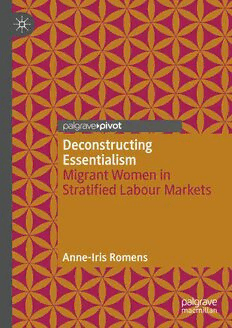
Deconstructing Essentialism: Migrant Women in Stratified Labour Markets PDF
Preview Deconstructing Essentialism: Migrant Women in Stratified Labour Markets
Deconstructing Essentialism Migrant Women in Stratified Labour Markets Anne-Iris Romens Deconstructing Essentialism Anne-Iris Romens Deconstructing Essentialism Migrant Women in Stratified Labour Markets Anne-Iris Romens University of Milan - Bicocca Milan, Italy ISBN 978-3-031-14398-4 ISBN 978-3-031-14399-1 (eBook) https://doi.org/10.1007/978-3-031-14399-1 © The Editor(s) (if applicable) and The Author(s), under exclusive licence to Springer Nature Switzerland AG 2022 This work is subject to copyright. All rights are solely and exclusively licensed by the Publisher, whether the whole or part of the material is concerned, specifically the rights of translation, reprinting, reuse of illustrations, recitation, broadcasting, reproduction on microfilms or in any other physical way, and transmission or information storage and retrieval, electronic adaptation, computer software, or by similar or dissimilar methodology now known or hereafter developed. The use of general descriptive names, registered names, trademarks, service marks, etc. in this publication does not imply, even in the absence of a specific statement, that such names are exempt from the relevant protective laws and regulations and therefore free for general use. The publisher, the authors, and the editors are safe to assume that the advice and information in this book are believed to be true and accurate at the date of publication. Neither the publisher nor the authors or the editors give a warranty, expressed or implied, with respect to the material contained herein or for any errors or omissions that may have been made. The publisher remains neutral with regard to jurisdictional claims in published maps and institutional affiliations. This Palgrave Macmillan imprint is published by the registered company Springer Nature Switzerland AG. The registered company address is: Gewerbestrasse 11, 6330 Cham, Switzerland Acknowledgments My first thanks go to the 51 participants who accepted to contribute to my research. Thank you for sharing your experience, feelings, and thoughts. I am specially grateful to Devi Sacchetto, from the University of Padua, for his support all along the process of conducting research and drafting a book. Special thanks also go to Valeria Piro, Thomas Romens, Angela Maria Toffanin, and Francesca Alice Vianello, for their support and the time they have dedicated to my work, proofreading the book, and pro- viding valuable comments. I also thank Valentina Pacetti and Paolo Rossi from the University of Milan Bicocca for their trust and support in con- ducting research. I would also like to express my gratitude to all the scholars and friends who have contributed to this work with proofreading, discussions, and facilitating access to participants. More specifically, I thank Eleonore Kofman and Kyoko Shinozaki, as well as Fabienne Bretin, Ligia Camargo, Aby Faye, Ru Gao, Paolo Gusmeroli, Tsara Hilbold, Sandra Agyei Kyeremeh, Abdoulaye Ngom, David Primo, Alessandra Siino, Stéphanie Specht, Isabelle Wilhelm, and the members of Arising Africans, associazi- one Ebene, association Plurielles and association Rhin-Volga. I am also grateful to Palgrave’s editors and staff, in particular to Alec Selwyn and Liam Inscoe - Jones, for making the project of publishing my v vi Acknowledgments research possible and to the anonymous reviewers for their useful comments. This work would not have been possible without the financial support of the University of Padua and the University of Milan Bicocca. Finally, I would like to especially thank my family and Alvise, for his patience and support, and a loving thanks to Leo, who often complained about mommy “working too much”. May 2022, Anne-Iris Romens. Mommy writing in English, Leo. Contents 1 Studying Stratifications and Essentialism in the Labour Market 1 2 “I Became a Migrant from Eastern Europe”. Essentialism and Migrant Women with Tertiary Education 23 3 “First the Europeans, Then Maybe the Filipinas, Then you”. Perceiving Stratifications and Essentialism 43 4 “She Wanted me to Take a Dictation Exercise”. Essentialism and the Embodiment of Skills 79 5 “I can’t Limit my Life to your Prejudices”. Coping and Resistance Strategies 107 6 “Maybe This Will Be Useful for the Future”. Expanding Research on Essentialism 139 I ndex 147 vii List of Tables Table 1.1 List of participants 10 Table 3.1 Views of women born in Sub-Saharan African countries on the impact of essentialism in accessing employment, according to the research context 49 Table 3.2 Views of women born in European non-EU countries on the impact of essentialism in accessing employment, according to the research context 53 ix List of Schemes Scheme 3.1 Views of labour market gatekeepers on the impact of essentialism in accessing employment in Alsace (France) 55 Scheme 3.2 Views of labour market gatekeepers on the impact of essentialism in accessing employment in Veneto (Italy) 58 Scheme 3.3 Recruiters’ perception of their agency in the recruitment and selection process 71 xi 1 Studying Stratifications and Essentialism in the Labour Market I repeated exactly, enunciating the syllables, what I had said: I wanted to prac- tice my social work profession, and I did not want anything else. This time, the counsellor, who, I knew later, was a social worker herself, could not repress her irritation at what she perceived as naivety or, even worse, stubbornness: “But do you know at least what a social worker is? And what path must be followed? You might consider something more accessible to you. Look, since it seems you want to work in this area, you could become a domestic assistant, that’s suitable”. Scholastique Mukasonga (2018: 133)1 The experience of Mukasonga’s heroine could be that of one of my interviewees. After struggling to obtain her diploma in Burundi, the woman is faced with French social workers and recruiters that give no value to her “so beautiful diploma”. Moreover, the employment counsel- lor advises her to look for a job with low social recognition in the care sector, where the woman will make little use of her educational back- ground and her prior professional experience. Scholastique Mukasonga 1 My translation. © The Author(s), under exclusive license to Springer Nature Switzerland AG 2022 1 A.-I. Romens, Deconstructing Essentialism, https://doi.org/10.1007/978-3-031-14399-1_1
